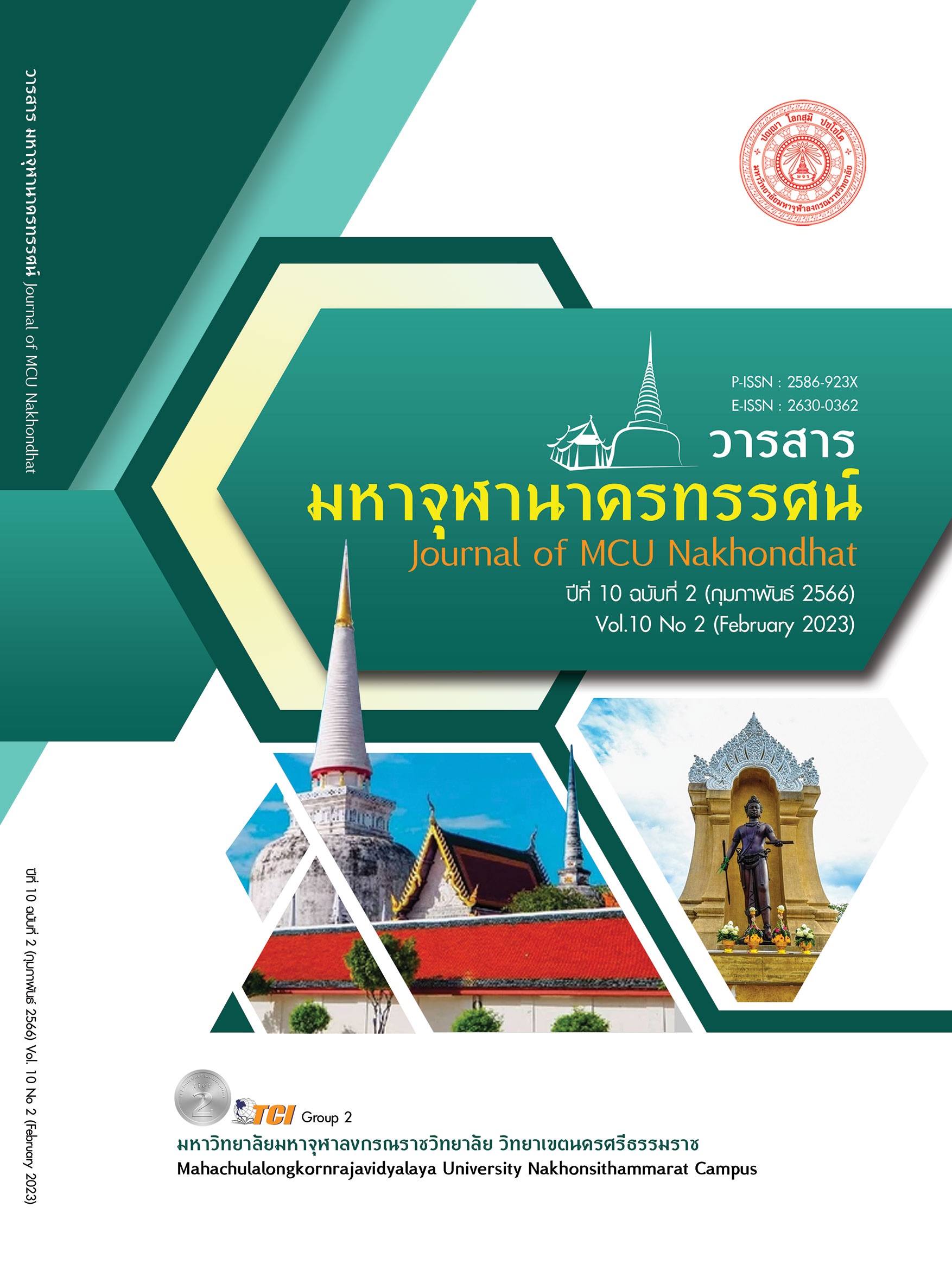THE HISTORY AND MORAL CONDUCT OF POHTAN KLAI VAJASIT
Main Article Content
Abstract
The objectives of this research article are 1) to study the history of Pohtan Klai as perceived by the monks of Wat Suan Khan and the people in Ban Suan Khan and 2) to study the moral conduct of Pohtan Klai as perceived by the monks of Wat Suan Khan and people in Ban Suan Khan. The research method is qualitative. Data was collected by in-depth interviews and data analysis by thematic analysis. The results showed that Pohtan Klai was appointed as the abbot of Suan Khan Temple in 1931, 34th year of monasticism which was 74 years, turning to 75 years, of monasticism. His moral conduct consisted of propagation of dhama in Thailand and other country, religious places and facilities (9 pagodas, 4 temples, 15 Buddhist chapels), public welfare work (20 roads, 15 bridges, numbers of water well), education support (4 schools), Buddist education (1 Dharma school). For monastic order, Pohtan Klai ruled the monks by showing the moral conduct and let the monks ruled each other. Pohtan Klai words always came true which people name him “Pohtan Klai vajasit”. Pohtan Klai was born in Changklang district, Nakornsrithamarat province on 28th March, 1876. He ordained as a novice at the age of late 19 years old, passed away on 5th December, 1970 with the age of late 95, tuning to 96 within months. He maintained a priesthood for full 74 which turning to 75 years. Pohtan Klai passed away for 52 years, however the faith still being remained in both monks and buddhists. There are also issues that need to be studied further, such as the year of birth. the precepts that lead to the existence of faith until now.
Article Details

This work is licensed under a Creative Commons Attribution-NonCommercial-NoDerivatives 4.0 International License.
References
กรมการศาสนา. (2553). หนังสือคู่มือพระสังฆาธิการว่าด้วย พระราชบัญัติกฎ ระเบียบ และคำสั่งของคณะสงฆ์. กรุงเทพมหานคร: โรงพิมพ์กรมการศาสนา.
กฤช เพิ่มทันจิตต์. (2528). ทฤษฎีการพึ่งพากับสังคมเศรษฐกิจไทย. กรุงเทพมหานคร: สำนักพิมพ์มหาวิทยาลัยธรรมศาสตร์.
ฉัตรทิพย์ นาถสุภา. (2527). ประวัติศาสตร์เศรษฐกิจไทย จนถึง พ.ศ.2484. ใน บรรณาธิการ โดยฉัตรทิพย์ นาถสุภา สมภพมานะรังสรรค์. กรุงเทพมหานคร: สำนักพิมพ์มหาวิทยาลัยธรรมศาสตร์ .
ฐากร สิทธิโชค. (2564). การดำรงอยู่ของความเชื่อตอหลวงพอเปี่ยม อินทสุวรรณโณ. วารสารจันทรเกษมศาสตร์, 27(1), 60-74.
ดำรงธรรม. (2552). ตามรอยอริยเจ้าพ่อท่านคล้ายวาจาสิทธิ์. กรุงเทพมหานคร: ไทยควอลิตี้บุคส์.
ธนากร พันธุระ. (2563). การศึกษาความสัมพันธ์ของความเชื่อทางศาสนา กับโครงสร้างอำนาจการเมืองไทย กรณีศึกษา คําสอนของพระมหาวุฒิชัย วชิรเมธี (ว. วชิรเมธี). วารสารสังคมศาสตร์และมนุษยศาสตร์, 40(1), 19-33.
พระธรรมกิตติวงศ์ (ทองดี สุรเตโช). (2548). คำวัด. กรุงเทพมหานคร: โรงพิมพ์เลี่ยงเชียง.
พระราชวราภรณ์. (2548). ชีวประวัติและอภินิหารของพระครูพิศิษฐ์อรรถการ(พ่อท่านคล้ายจนฺทสุวณฺโณ). (พิมพ์ครั้งที่ 3). กรุงเทพมหานคร: โรงพิมพ์เลี่ยงเชียง.
มหาจุฬาลงกรณราชวิทยาลัย. (2539). พระไตรปิฎกฉบับภาษาไทย ฉบับมหาจุฬาลงกรณราชวิทยาลัย. กรุงเทพมหานคร: โรงพิมพ์มหาจุฬาลงกรณราชวิทยาลัย.
รังสรรค์ ธนะพรพันธ์. (2523). ระบบเศรษฐกิจไทย: วิกฤตการณ์แห่งโครงสร้างและวิกฤตการณ์แห่งเส้นทางการพัฒนาเศรษฐกิจ. วารสารธรรมศาสตร์, 10(1), 12-21.


